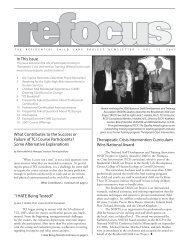The Therapeutic Crisis Intervention System - Residential Child Care ...
The Therapeutic Crisis Intervention System - Residential Child Care ...
The Therapeutic Crisis Intervention System - Residential Child Care ...
Create successful ePaper yourself
Turn your PDF publications into a flip-book with our unique Google optimized e-Paper software.
Preface<br />
<strong>The</strong> Family Life Development Center<br />
<strong>The</strong> Family Life Development Center (FLDC) was<br />
established by New York State legislation in 1974.<br />
<strong>The</strong> Center’s mission is to improve professional and<br />
public efforts to understand and deal with risk and<br />
protective factors in the lives of children, youth,<br />
families, and communities that affect family strength,<br />
child wellbeing, and youth development. <strong>The</strong><br />
<strong>The</strong>rapeutic <strong>Crisis</strong> <strong>Intervention</strong> (TCI) system is one<br />
of several programs delivered by the FLDC relevant<br />
to the lives of children, families, and care agencies.<br />
In the early 1980s, under a grant from the National<br />
Center on <strong>Child</strong> Abuse and Neglect, Cornell<br />
University developed the TCI crisis prevention<br />
and intervention model for residential child care<br />
organizations as part of the <strong>Residential</strong> <strong>Child</strong> <strong>Care</strong><br />
Project (RCCP). <strong>The</strong> TCI system assists organizations<br />
in preventing crises from occurring, de-escalating<br />
potential crises, managing acute physical behavior,<br />
reducing potential and actual injury to young<br />
people and staff, teaching young people adaptive<br />
coping skills, and developing a learning organization.<br />
This model gives organizations a framework for<br />
implementing a crisis prevention and management<br />
system that reduces the need to rely on high-risk<br />
interventions.<br />
<strong>The</strong> RCCP supports vigorous and ongoing in-house<br />
evaluation of TCI training and implementation<br />
efforts through testing participants’ knowledge and<br />
skills, a certification program, formal assessment,<br />
and direct monitoring of agencies’ use of highrisk<br />
interventions. <strong>The</strong> RCCP seeks to maintain<br />
a leadership role in discovering new knowledge,<br />
establishing new approaches to knowledge<br />
dissemination, and developing innovative programs<br />
to enable child caring agencies to serve children,<br />
youth, and families more effectively by building<br />
strong linkages among research, outreach activities,<br />
and evaluation efforts. <strong>The</strong>se relationships are viewed<br />
as cyclical: research leads to the development of<br />
innovative and effective outreach programs, which are<br />
carefully evaluated. Evaluation activities contribute<br />
directly to the adaptation and improvement of<br />
outreach programs and may also contribute to new<br />
Research<br />
Evaluation Outreach<br />
Figure 1. Research, Practice, and Evaluation Cycle<br />
research. In-house and external evaluations have been<br />
essential in modifying intervention strategies and<br />
protocols to improve the TCI system’s effectiveness<br />
for a wide range of organizations (see Figure 1).<br />
Since the curriculum’s inception there have been five<br />
major revisions. <strong>The</strong> revision process has generally<br />
included (a) examining the evaluation results and<br />
research conducted by the RCCP, (b) reviewing<br />
related literature and research, (c) conducting surveys<br />
of organizations using the TCI system, (d) talking to<br />
other crisis management training providers, and (e)<br />
convening experts for consultation and review.<br />
THERAPEUTIC CRISIS INTERVENTION SYSTEM: <strong>Residential</strong> <strong>Child</strong> <strong>Care</strong> Project, Cornell University 5<br />
Preface



